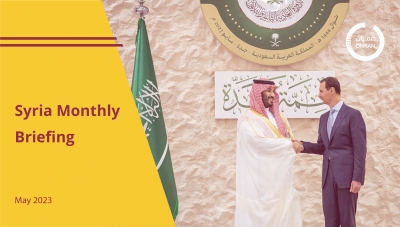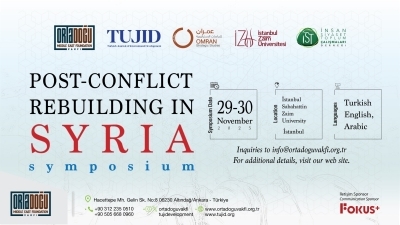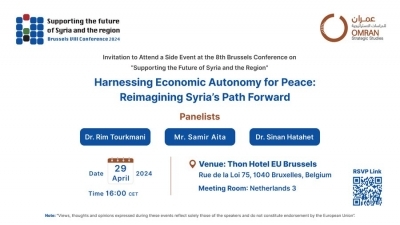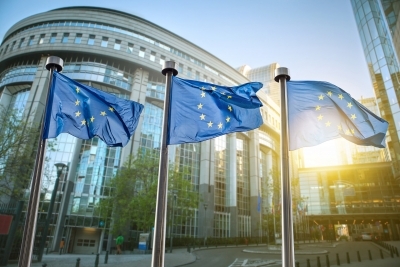General summary
During May 2023, the majority of Arab countries moved towards fully restoring relations with the Assad regime, leading to Bashar al-Assad attending the Arab summit in Saudi Arabia, breaking a decade-long isolation. The Syrian regime saw this as the official end of the regional and international isolation that was imposed against the Syrian regime. Regarding security development in the southern region, 2 Jordanian fighter jets conducted raids, eliminating one of the big local drug dealer in as-Suwayda's eastern countryside. While in the Northwest region, Turkish security forces raided the hideout for an ISIS cell, leading to the arrest of several ISIS members, including a high commander known as “The Wali of Turkey”, also during the same month Turkey in corporation with the US, imposed new sanctions on individuals financing “Hay'at Tahrir al-Sham” in Syria.Economically, livelihood situation in different areas of control is still in decline, as the month of May witnessed a new price increase for most commodities.
Syrian regimes return to Arab League
The most prominent political event in May was the return of the Assad regime to the Arab League, marking a new stage of formal Arab engagement with Syria after a decade-long hiatus. This Arab rapprochement focuses on security issues, counterterrorism, humanitarian issues, particularly refugees, and the political process. However, the evolution of Arab engagement largely depends on the regime's response to political developments and its willingness to make concessions it has avoided over the years. Assad is relying on Arab openness as a step to pressure the United States and the European Union to ease or lift sanctions on his regime, claiming they hinder progress in the Arab solution initiative. Regionally, the visit of the Iranian President to Syria was significant in its timing, just days before the Arab League's decision to formally reconnect with the regime. The visit reaffirmed Iran's strong influence in Syria and preempted any attempts to diminish it.
In summary, Arab rapprochement with the Assad regime is part of a regional policy to deescalate tensions, in addition to addressing security issues related to the Syrian crisis.
Eliminations and reconciliations
In May 2023, Israel carried out aggressive air strikes on Damascus and Aleppo provinces, hitting security sites near their respective international airports and causing temporary shutdowns. This occurred as Israel's Defense Minister, “Yoav Gallant,” declared an increase in attacks aimed at Iran's presence in Syria.
Meanwhile, Turkish security forces succeeded in arresting /4/ ISIS members, including the self-proclaimed (Wali of Turkey). This happened after the Turkish forces had neutralized ISIS leader, “Abu al-Hussein al-Qurashi”, in late April. Also in the Northwestern region, and as part of the Turkish collaborative efforts against terrorism, the US and Turkish treasury departments imposed combined sanctions on 2 individuals tied to financing of extremist factions in Syria.
In Northeastern Syria, an IED’s killed “Kribos”, a leader in SDF. Furthermore, the Asayish security force, arrested 2 individuals involved in drug trafficking.
In Southern Syria, the Regime government initiated a new settlement in 45 towns, this campaign coincides with an ongoing conflict between the Military Security and the 8th Brigade, and a fragile security situation, also this settlement campaign is considered the 3rd one in Daraa since 2018.
Meanwhile, Jordanian fighters eliminated a drug dealer in the Eastern countryside of As-Suwayda shortly after Jordanian Foreign Minister “Ayman Safadi” declared the possibility of using military force to combat drugs, which is an indication of the possibility of resorting to force options in addition to economic incentives in the Arab way of dealing with the Syrian regime, including drugs production and smuggling.
Reviving a long dead economy
In hopes of capitalizing on improving Arab relations, the Assad regime is gearing up for the tourism season, with a particular focus on attracting visitors from the Gulf countries. Tourism, which was the second-largest source of foreign income after oil exports, generating approximately $3.9 billion in 2010, is seen as a vital avenue for bolstering Syria's economy. Estimates suggest that about /2.5/ million people, including /700,000/ tourists, might visit Syria this year.
Additionally, Bashar al-Assad issued a law exempting cow imports from taxes and fees for the next 5 years. This move is aimed at mitigating the Syrian crisis' impact on the livestock sector, high meat prices, and decreasing livestock numbers. However, this approach, which is characteristic of the old regime, might benefit corrupt merchants and warlords while negatively affecting ordinary people's living conditions, it's seen as a way to address economic issues primarily through increased imports.
In Northeastern Syria, the Autonomous Administration announced the pricing of wheat and barley for the 2023 agricultural season, at /43/ cents per kilogram for wheat and /35/ cents per kilogram for barley. This is the 1st time the Administration set crop prices in $ instead of SYP due to the declining value of the latter, causing unprecedented inflation for goods and services. In Hasakah province, (ampere) prices rose by 30% due to a reduction in the subsidized diesel amount sold to generator owners by the Administration. The closure of the “Semalka-Fishkhabour” crossing between Northeastern Syria and Kurdistan led to significant slowdowns in construction and a halt in some projects due to a shortage of cement, and /50/ kilogram bag of cement reached a black-market price of /120,000/ SYP, up from /85,000/ Sp before the crossing was closed.
In opposition held-areas, the decline in the value of the Turkish lira against the dollar led to deteriorating living conditions in Idlib and a slowdown in market transactions. Changes in the lira-dollar exchange rate quickly affect local markets due to imports mainly coming through Turkey. Meat prices doubled, with one kilogram of lamb now costing /190/ TL, up from /80/ TL two months ago. This increase is due to livestock smuggling to regime-controlled and autonomous areas, in addition to rising feed costs.
The Economy and Resources Ministry of the "Salvation" Government in Idlib set the purchase price for first-grade hard wheat at $320 per ton (/32/ cents per kilogram). This year's initial wheat production is estimated at /99,000/ tons.
Work continues on paving main and secondary roads in Azaz, al-Bab, and Jarabulus, as part of early recovery efforts. New schools, like Al-Khwarizmi in Azaz and Shariah school in Afrin, are being established, while others in Janders are being renovated. Furthermore, Turkish Interior Minister Suleiman Soylu and Gaziantep Mayor Fatma Sahin laid the foundation for a project to build 240,000 homes on farmland near Al-Ghandoura.




